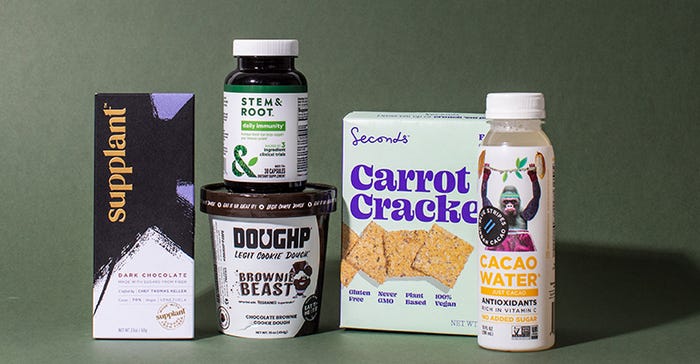June 28, 2022

There is no one-size-fits-all solution for ways that brands can have a climate-positive impact, but a common denominator is, or at least should be, transparency. Consumers support brands that honestly measure and display their sustainability roadmap and the steps they are taking toward positive change. Brands leading the way tackle sustainability at each point in a product’s lifecycle: efficient packaging, upcycling materials, reducing carbon emissions and creating close supplier relationships.
For the June/July/August issue, NFM asked four experts representing different sustainability spheres and organizations to contribute their insights on sustainability and how retailers and brands can make real, measurable progress.
Beverages made from leftover whey and barley. Pet treats crafted from blueberries, squash and sweet potatoes once destined for landfills. Foodservice products such as broth that incorporate surplus farm vegetables.
All of these products and many more now concretely contribute toward sustainability. How? Because they work with the Upcycled Food Association (UFA) to leverage otherwise wasted food ingredients into their products.
More than 30% of all food produced around the world goes to waste. Agriculture and livestock production account for about 10% of greenhouse gas emissions, but with so much food getting sent to landfills and moldering in fields, close to a third of that environmental cost is unnecessary. Mitigating food waste, with a goal toward one day largely eliminating it, represents a straightforward way to help the planet.
It took the creation of a third-party validated Upcycled Food Association seal, however, to propel upcycling foods from a splendid idea into a movement that is making a difference.
Sustainability claims today swamp the CPG industry. But in far too many cases, the label swagger amounts to just so much self-puffery. Third-party validation can take these claims from hollow to dependable by offering consumers and retailers the transparency they demand and deserve.
When it comes to upcycling, the UFA does just that. Launched in 2020, the bulk of the association’s initial efforts went toward creating standards and protocols—the rules brands and farmers would have to follow to gain the UFA seal. Once that complex effort was complete, the UFA then turned to the all-important third-party validation part of the equation.
Consumers and retailers who encounter the UFA seal on CPG brands today—less than a year after introducing the seal, more than 200 companies are participating—trust that the brands not only had to follow rigorous procedures and guidelines, but also were forced to endure comprehensive and penetrating third-party examinations of their work.
retailers who encounter the UFA seal on CPG brands today—less than a year after introducing the seal, more than 200 companies are participating—trust that the brands not only had to follow rigorous procedures and guidelines, but also were forced to endure comprehensive and penetrating third-party examinations of their work.
Those 200 companies that now sport the UFA seal, with many more on the way, are preventing more than 800 million pounds of food waste every year. How do we know this? Because UFA certification is measurable—when a brand uses leftover carrots for its new chips, our process tracks exactly how many pounds of carrots were diverted from landfills to make that salty snack.
Sustainability itself is a buzzword, but it is grounded in something important: Working toward developing ways that humans can thrive on Earth without degrading the planet’s ability to support healthy life for animals, waterways, soil, air and more. One important component of actually achieving sustainability goals is developing rigorous standards, backing them with third-party verification and letting consumers and manufacturers know that the products with the seals are actually walking the talk.

Transparency in upcycling
While not every product can contain 95% or more upcycled ingredients (though some do), we applaud those brands that are not only incorporating upcycled ingredients into their products, but are also promoting an open and transparent conversation about this growing movement to combat food waste.
Supplant Dark Chocolate Bar
Crafted with Chef Thomas Keller, Supplant’s enticing chocolate bars use sugar made from plant fibers sourced from upcycled agricultural side streams, such as stems, stalks, husks and cobs. These materials are broken down with fungi-derived enzymes, yielding a sugar that is lower in calories and has a lower glycemic response than traditional sugar. SRP: $9.99
Stem & Root Daily Immunity
A new immune-supporting nutrient has been found within the carrot pomace—the remains leftover from juicing. This upcycled pomace is processed to unlock cRG-I, a polysaccharide shown to cut symptom severity and duration of colds by 20% and 25%, respectively. The plant-based ingredient is BeniCaros; the Stem & Root brand is from Bayer. SRP: $23.99/30 capsules
Doughp Brownie Beast Cookie Dough
Raw or baked, this chocolate brownie-packed cookie dough is one of the latest in a new wave of brands working together on waste reduction. Partnering with upcycled food pioneer ReGrained, Doughp swapped a portion of flour from its classic recipe with the former’s nutrient-dense SuperGrain+ flour, made from upcycled spent barley from beer. SRP: $8.99
Seconds Carrot Crackers, Everything Crunch
The main attraction in these gluten-free, non-GMO crackers is upcycled carrot flour made from leftover carrot pulp and skins sourced from juice and produce companies. Blended with upcycled oat milk flour, these crunchy bites also contain tapioca flour, flax and chia seeds, coconut aminos and nutritional yeast. SRP: $14.00/2 boxes
Blue Stripes Urban Cacao, Just Cacao Cacao Water
Blue Stripe’s mission focuses on using the whole cacao plant—including fruit, shells and beans—to reduce food waste and help support cacao farmers. This Non-GMO Project Verified, Certified Vegan and UFA Certified beverage has just two ingredients: cold-pressed cacao juice from the cacao fruit and water. SRP: $2.99
You May Also Like
.png?width=700&auto=webp&quality=80&disable=upscale)



